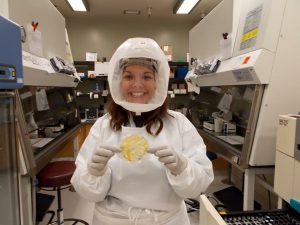Keri Lynn Robinson ’14
B.S. Biology, Public Health minor
Microbiologist, Centers for Disease Control and Prevention, Center for Global Health, Atlanta, Georgia
(Previous: CDC Emerging Infectious Disease Laboratory Fellow, Shoreline, Washington)
Hometown: Highland, New York
Current residence: Atlanta, Georgia
 It isn’t easy to land an Emerging Infectious Disease Fellowship with the federal Centers for Disease Control and Prevention. Keri Robinson was among 330 scholars who applied in 2014 for the chance to study the CDC’s responses to malaria and other infectious diseases and then apply the training in a public health lab. She was one of five selected for the one-year fellowship – and the only one without a graduate education.
It isn’t easy to land an Emerging Infectious Disease Fellowship with the federal Centers for Disease Control and Prevention. Keri Robinson was among 330 scholars who applied in 2014 for the chance to study the CDC’s responses to malaria and other infectious diseases and then apply the training in a public health lab. She was one of five selected for the one-year fellowship – and the only one without a graduate education.
But Robinson, who had long eyed a career with the CDC, was ready. Her education in the labs and classrooms of Saint Rose and her internship and summer positions at the New York State Department of Health’s Wadsworth Laboratory in Albany were as good as an advanced degree. “I was able to jump right in, be independent and not need my supervisor for a lot of the work,” said Robinson, who was assigned to help Washington state prepare for Ebola and other infectious diseases by developing and then training staff on new tests. “I had the scientific knowledge and I also knew what to expect in terms of procedures and protocol.”
The road to the fellowship began in Robinson’s sophomore year, when her biology professors told her about it. She excelled in her classes, presented research at two undergraduate research symposiums, created a “Speed Science” networking event and volunteered at the Albany Damien Center. She earned the Biology Department’s service award for two years. Robinson applied to graduate schools – and was admitted – in case the fellowship didn’t pan out.
But it did. And after completing it, she was hired permanently with the CDC’s Center for Global Health, Division of Parasitic Diseases and Malaria. She travels to Tanzania, Haiti and other developing countries to train health officials to respond to tropical infectious diseases that do not have to claim lives. It is precisely what she wanted to do. “I am super grateful to Saint Rose,” she said. “It was the professors who knew what I wanted and got me there.”

